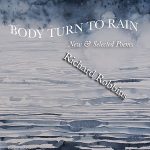We hope that you’re as excited as we are for our brilliant event tomorrow night, Ten Poems (Possibly) Impossible to Write with international writer Richard Robbins. Ahead of tomorrow’s event, SWC Director Rachel Walker talked to Richard about his advice for composing poetry, the importance of authenticity in his work, and what he enjoys about poetry. Read on to find out more!
Your event focuses on your writing development and the idea that, as an established poet, you should be continually challenging yourself. As a writer, do you have any bad habits that you have striven to overcome?
There is always the temptation to put less important things before a regular writing regimen, so one bad habit might be giving in to that temptation too often. Another might be reaching too impatiently, in the course of composition, for the shape or sense of the emerging poem. Of course, the more one writes, the more one can cultivate a wariness toward such things.
You speak of a ‘comfort zone’ that beginner poets should cultivate. Do you have a literal ‘comfort zone’ for writing – a place or a frame of mind in which you write best?
I’m not sure beginning poets should cultivate a comfort zone; I just think that they do so anyway. So much of one’s early artistic work is in search of an authentic subject matter, an authentic voice and an authentic emotional centre from which to speak. It makes sense that when one arrive at an authentic emotional centre in the occasion of a poem, one’s first impulse would be to try to repeat the process in the text. This is natural. Over the long haul, however, one must regularly dislocate oneself to keep one’s work fresh and one’s own sensibility stimulated. I’m not talking about perfunctory acts of discombobulation, but rather regularly challenging what is automatic in one’s process and thereby disposing oneself to discover new words and shapes of saying. It follows, then, that rather than seeking a comfort zone for myself, I would hope to seek an openness toward the new.
Do you have a favourite poet? Any work that has particularly inspired you?
I am inspired by different things by different poets, so I could never arrive at a single favorite. One poet’s relaxed and meditative style will call to me, even as the hyperkinetic energy and motion of another will call me for other reasons. I have a fondness for the simple and plain-spoken quality of one poet’s work, even as I am attracted by the high-wire virtuosity of another’s. Basically, what I want from a poet I will read again and again is honesty and the sense that the poem was written for a reason.
Do you have any advice for writers who aim to challenge and improve their previous writing?
One thing I will discuss in my talk is John Berryman’s advice, “You should always be trying to write the poem you are unable to write.” With the bar set thus, we may fail more, but we will be less likely to find ourselves continually in the same rut.
What have you learned from deconstructing poetry? Has there been any lessons that have considerably influenced your own poetry?
Much of my reading experience, beyond the assimilation of content, is noticing craft. How did the poet do this thing? How did the tone of the speaker prepare me for what was coming later? How did the choreography of form control my reception of the poem? Much of what one learns from this reading-like-a-writer is never verbalized, but it nonetheless has an influence on one’s own poems. In my own work, the process has made me more sensitive to how I can engage a reader even as I am discovering myself what it is I want to say.
Interview by Rachel Walker





